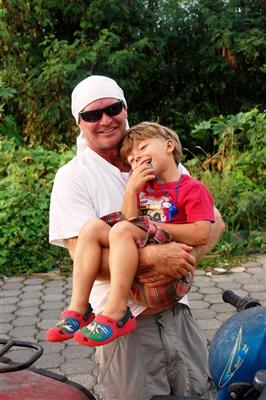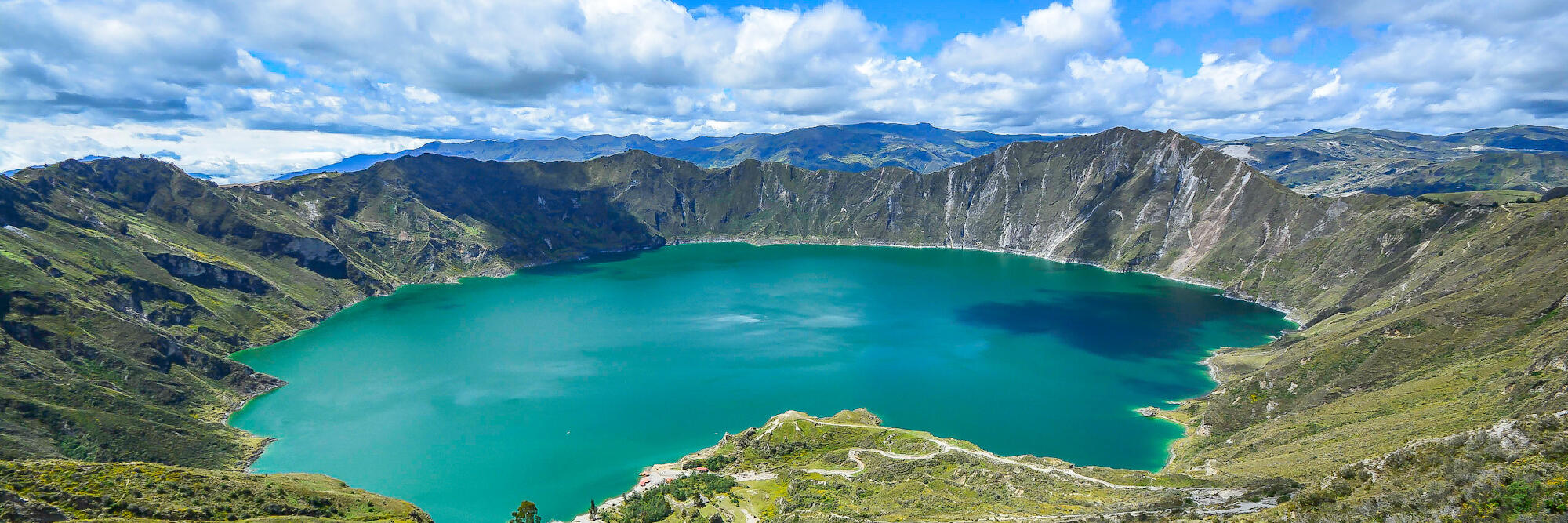Rick Schleicher is an American expat who moved to Ecuador in 2004. He runs a travel website called Come to Galapagos, which is the perfect resource for expats looking to visit Ecuador. He shares his numerous experiences of living in Ecuador, providing invaluable advice about the relaxed lifestyle the country has to offer as well as the challenges that he has faced during his assimilation.
 About Rick
About Rick
Q: Where are you originally from?
A: Marin County, California
Q: Where are you living now?
A: San Cristobal, Galapagos, Ecuador
Q: When did you move to Ecuador?
A: 2004
Q: Did you move here alone or with a spouse/family?
A: I met a local woman while travelling and a year later we were married.
Q: Why did you move; what do you do?
A: I moved because my wife, after experiencing the US for eight months, did not want to live there. I own a travel company that offers community-based, customized, private tours of the Galapagos.
Living in Ecuador
Q: What do you enjoy most about Ecuador? How would you rate the quality of life compared to America?
A: There’s virtually no crime here. Everyone knows everyone which is both good and bad. We don’t have cars. There’s nowhere to go if we did. I spend a lot of time in the ocean. I’ve been able to be with my son on average more than four hours a day, every day of his life since he was born.
Q: Any negatives? What do you miss most about home?
A: At first I thought these “Enchanted Islands” were called enchanted because the animals were all so spellbound, so fearless/friendly and other-world-like. I thought maybe it had to do with how enchanting it felt to be here. Turns out these islands were named “enchanted” because it was hard to locate them given the navigational aids at the time. They exist at the terminus of six ocean currents and before the advent of modern navigation it was really easy to miss them, just sail on by being swept off your calculated course by a current you were unaware of, the mountain tops you might have seen enshrouded by clouds. That sounds a lot like the Galapagos today, a group of islands lost, being swept over by a current few people care to measure, obscured by propaganda.
I thought a lot of things at first, took many of my assumptions for truth. It has taken me years to come to what some would say is a catastrophic misunderstanding of the dynamic cultural, political and economic forces acting on the Galapagos today. My only response to them would be that I’m to this day still enchanted, under a spell and hopeful for a better future than what appears to be in the cards for the Galapagos.
These islands are sometimes reported to be, often advertised as paradise. It is the San Cristobal municipality’s slogan, “Galapagos, Paradise of the World”. Everyone living here is so numb to hearing this that when someone asks me what’s up or how I’m doing, I’ll often cite the day and then the slogan, “Just another Wednesday in paradise.”
I miss the produce section of almost any market in the US, also Home Depot.
Q: What are the biggest adjustments you had to make when settling into expat life here? Did you experience any particular elements of culture shock?
A: We run out of things sometimes, like cheese or toilet paper. I’ve never seen the island run out of beer or rum. I suppose I could concoct a rum bidet. The internet is slow and international phone calls get cut off. There is no freedom of the press. A fun story I like to tell: in 2004, we were sitting in a tiny open-air snack bar next to the sun-blasted runway of a small airport on a very large practically uninhabited desert island. Sitting with us was the Governess of this group of islands, a very cordial woman and friend of my then-future, now ex-wife. The heat was “insoportable” (unsupportable). Cotton clothes pasted to our skins, the table littered with the tiny, four inch by four inch sweat soaked paper napkins we’d used to wipe our brows, cheeks, arms. What we really needed were towels or maybe air conditioning. I could see the Governess’s ample, pale belly protruding between the buttons of her blouse, blue-white and baby textured, I imagined. She asked me quite seriously, since I was from California, if the next time I spoke with Governor Arnold Schwarzenegger, would I please extend him her personal invitation to visit these islands?
Q: What’s the cost of living compared to home? What is cheap or expensive in particular?
A: It is far less expensive to live here than the US.
Q: How would you rate the public transport? What are the different options? Do you need to own a car?
A: There is very limited public transport, but then there are also very limited places to go, most of which you could walk to anyway.
Q: How would you rate the healthcare in your city? Have you had any particularly good/bad experiences with regards to doctors and hospitals? Are there any hospitals you would recommend?
A: It is better now than it was only a few short years ago. People used to die in the hospitals because of inept doctors. Still if you are seriously ill, you get on a plane and go to Quito or Guayaquil.
Q: What are the biggest safety issues facing expats living in Ecuador? Are there any areas expats should avoid?
A: Don’t drink the tap water, don’t swim at the mouths of rivers after a flood.
Q: How do you rate the standard of housing in the city? What different options are available for expats?
A: Concrete buildings, poor plumbing, but all manageable.
Meeting people and making friends
Q: How tolerant are the locals of foreigners? Is there any obvious discrimination against particular religions or women etc.?
A: No issues with foreigners. You can’t live here unless you are a resident of the Galapagos and the only way to be a resident is to marry into it.
Q: Was it easy meeting people and making friends? How did you go about meeting new people?
A: No problems at all in this regard.
Q: Have you made friends with locals or do you mix mainly with other expats? What advice would you give to new expats looking to make friends? Any social/expat groups you can recommend?
A: The first thing is you make friends with the people who are here, not so much with people that are going and coming as they do.
Family and children
Q: What are the schools like, any particular suggestions?
A: The schools are, at best, bad. I’d recommend homeschooling if you want your kids to actually learn anything other than how to cuss and fight. (Not that those aren’t necessarily valuable skills…)
And finally…
Q: Is there any other advice you would like to offer new expat arrivals?
A: They say that luck is what happens when preparedness meets opportunity. For my part I have never been properly prepared for all the luck that has come my way. I did not “plan” my way into this. My suggestion is for you to not either. Go somewhere, spend some time there, a LOT of time…and see what happens before you make any choices.
~Interviewed January 2016



